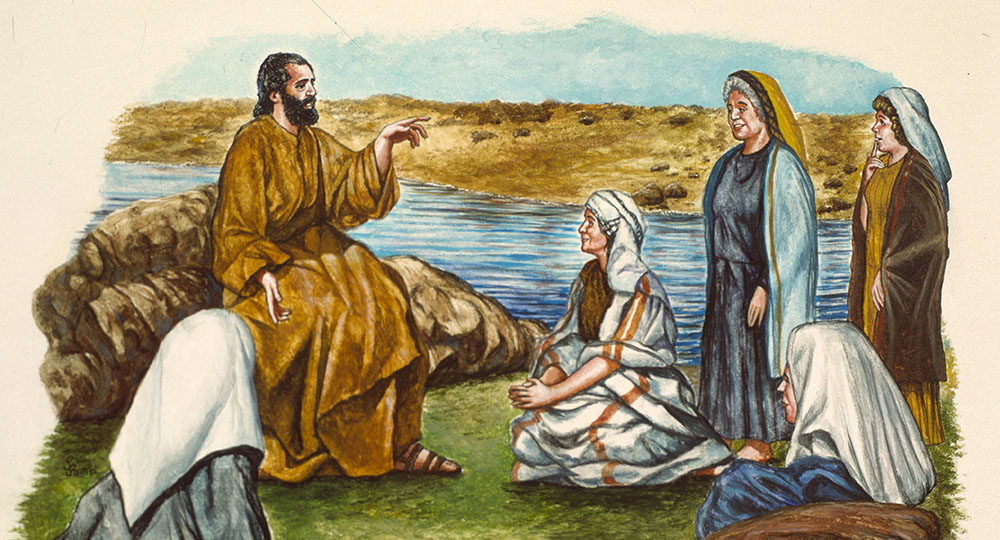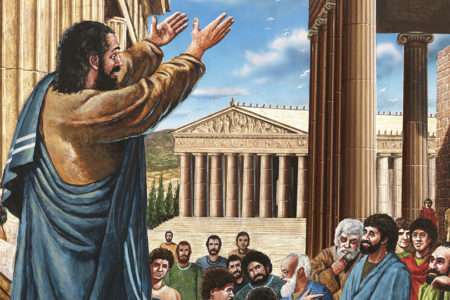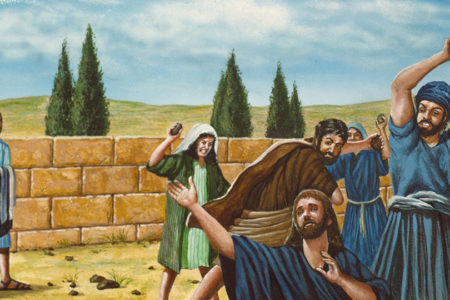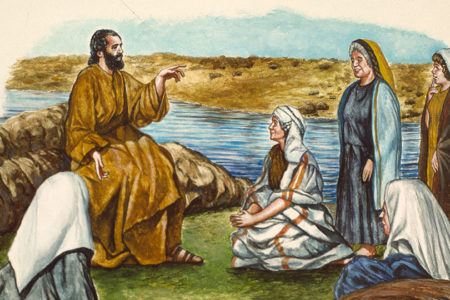Paul’s Method of Evangelism
The greatest missionary-evangelist of all time was the Apostle Paul. His ministry and methods put most of ours to shame. This servant of the Lord touched multitudes of people across the world of his day. His deeds were accomplished in a pagan culture, without the benefit of the modern means at our disposal today. He ministered to the throngs and established churches wherever he traveled, yet he always had time to reach out to and disciple an individual for Christ. This article examines the life and methods of this spiritual giant and encourages us to be more like him.
Any worthwhile ordination council, formed to examine a man prior to his entry into the ministry, usually questions the candidate relative to four areas: his salvation, his call to the ministry, his doctrinal position, and practical matters. In examining Paul’s call, we will learn something about the methods he used throughout his life and ministry.
His Call by God Was Clear
In his defense before King Agrippa, Paul spoke of his conversion experience and also told him of his call. At the time of his salvation, Jesus said to this young man, arise, and stand upon thy feet; for I have appeared unto thee for this purpose, to make thee a minister and a witness both of these things which thou hast seen, and of those things in which I will appear unto thee; Delivering thee from the people, and from the Gentiles, unto whom now I send thee, To open their eyes, and to turn them from darkness to light, and from the power of Satan unto God, that they may receive forgiveness of sins, and inheritance among them who are sanctified by faith that is in me” (Acts 26:16–18). “But the Lord said unto him [Ananias] Go thy way; for he [Paul] is a chosen vessel unto me, to bear my name before the Gentiles and kings, and the children of Israel” (Acts 9:15).
When Paul encountered the Lord Jesus Christ on the Damascus road, he received his call directly from Him. The Lord then informed Ananias of Paul’s call, so that he would receive Paul and present him to the other believers in Damascus.
He Immediately Began to Witness for His Lord
At the time of his call, Paul made a total commitment to Christ. He had a prestigious educational background in Judaism, having sat at the feet of Gamaliel, so he was ready to minister—or was he?
Shortly after he came to the Lord, and just following his baptism, “immediately he preached Christ in the synagogues, that he is the Son of God. But all that heard him were amazed,” for they had known him as Saul of Tarsus, the one who destroyed the Lord’s work in Jerusalem. However, as he preached he gained confidence and confounded the opposition. Although he proved himself very capable, his enemies sought to kill him, and he had to flee the city, being let down the wall in a basket (Acts 9:20–25).
He Was Counseled in the Wilderness
Although Paul preached and gave his testimony in Damascus, that was not his real training period. Before the Lord could use him in a mighty way, Paul needed preparation. Without going to Jerusalem or conferring with other people, Paul was led by the Lord into Arabia. There was no theological school in Arabia; neither is there evidence of a great teacher in residence in the desert. Rather, Paul went there to spend time alone communing with the Lord. According to Galatians 1:15–18, he was in Arabia for approximately three years, learning from the Lord about His Word. While there, he developed the clear gospel explanation he gave in Romans and Galatians. He also learned the methods of evangelism that he used for the remainder of his life.
His Missionary Journeys
In Romans 1:16, Paul wrote, “to the Jew first,” and this proved to be the pattern of his ministry. No matter where he went, he sought to touch Jewish lives first.
When Paul launched out on his missionary journeys, he always began his ministry in a new location in the synagogue. “And when they were at Salamis, they preached the word of God in the synagogues of the Jews” (Acts 13:5; see also 13:14; 14:1; 17:1–2, 10, 17; 18:4, 26; 19:8). It is evident that a major part of his early ministry in each city was to the Jewish people in their own synagogue. He usually stayed as long as he could.
On several occasions Paul was unable to find a synagogue. Once he went to the riverside and preached to some women who had gathered there for prayer (Acts 16:13). These Jewish women probably met there because there was not a minion of ten men necessary to conduct a formal worship service. It was there that Paul led Lydia to the Lord. Even though there was no synagogue, he ministered just the same.
His Varied Methods of Ministry
HE USED MESSIANIC PROPHECY
The Scriptures record that on several occasions Paul preached that Jesus is the Son of God. To prove his point, he demonstrated that Jesus is the fulfillment of the Old Testament prophecies concerning the Messiah. A good example of this is found in Acts 13, where Paul preached in the synagogue at Antioch. He pointed out that Jesus was of the seed of David, according to God’s promise (vv. 22–23). He also spoke of Christ’s crucifixion: “And when they had fulfilled all that was written of him, they took him down from the tree, and laid him in a sepulcher” (v. 29). Later in the same message he used the messianic Scriptures to prove that Jesus fulfilled the prophecies concerning the resurrection (vv. 34–35).
HE REASONED WITH MEN
There are two classic illustrations in Acts 17 of Paul’s reasoning with people. The first occasion was in the synagogue at Thessalonica. “And Paul, as his manner was, went in unto them, and three sabbath days reasoned with them out of the scriptures, Opening and alleging that Christ must needs have suffered, and risen again from the dead; and that this Jesus, whom I preach unto you, is Christ” (vv. 2–3).
Later in the same chapter, Paul preached to the Athenian philosophers as he stood on Mars’ Hill, overlooking the city of Athens. This was a classic example of philosophical reasoning. Although most turned away from the truths presented and Paul departed from the area, certain people believed and followed him. They included “Dionysius, the Areopagite, and a woman named Damaris, and others with them” (v. 34).
No matter where he went or to whom he ministered, this brilliant apostle was up to the challenge. He was a master with words and logic. The fisherman-turned-apostle, Peter, recognized Paul’s abilities in communication when he wrote, “our beloved brother, Paul, also according to the wisdom given unto him hath written unto you; As also in all his epistles, speaking in them of these things, in which are some things hard to be understood, which they that are unlearned and unstable wrest, as they do also the other scriptures, unto their own destruction” (2 Pet. 3:15–16).
HE USED HIS OWN DEFENSE TO PRESENT THE GOSPEL
In the Book of Acts (especially in the latter chapters), Luke recorded several occasions when Paul had to defend his ministry and position before the leaders of his day. He was fearless, and in each case his testimony clearly presented the gospel.
The first such incident was before a multitude of the Jews (Acts 21:27–22:21). He explained that, while on his way to Damascus to persecute the Church of Christ, he met the Lord on the highway. The crowd clearly heard the gospel in his testimony.
On another occasion (recorded in chapter 24), Paul stood before Felix, who, having heard his testimony, deferred a decision until Lysias the chief captain, could come. He placed Paul under house arrest, “And after certain days, when Felix came with his wife, Drusilla, who was a Jewess, he sent for Paul, and heard him concerning the faith in Christ. And as he reasoned of righteousness, self-control, and judgment to come, Felix trembled, and answered, Go thy way for this time; when I have a convenient season, I will call for thee” (vv. 24–25).
Again, in his own defense, Paul faithfully testified of Christ before King Agrippa, who said, “Almost thou persuadest me to be a Christian” (Acts 26:28).
HE USED HIS TEACHINGS TO PRESENT THE GOSPEL
All of Paul’s messages contained teaching but his greatest teachings are found in the epistles he penned. For example, in the epistles to the Romans and to the church in Galatia, Paul presented a clear explanation of the gospel.
Paul’s Goal Was to Preach the Gospel and Start Churches
Paul apparently preached daily to reach the multitudes. In some places his stay was very short, and he was literally forced to leave some areas. In other places he was able to minister for extended periods of time.
But it was never the apostle’s desire to evangelize people and then leave them on their own. And so, after beginning a ministry in a new location, he quickly organized the new converts into a church. In this way, the believers could grow, worship, and serve the Lord. By growing in the Lord, they could, in turn, begin their own outreach ministry. The local church is God’s plan to reach the world.
After leading people to Christ, Paul confirmed the new believers. “And when they had preached the gospel to that city, and had taught many, they returned again to Lystra, and to Iconium, and Antioch, Confirming the souls of the disciples, and exhorting them to continue in the faith, and that we must through much tribulation enter into the kingdom of God” (Acts 14:21–22). The confirmation spoken of here is not the same thing as a confirmation class today. Paul returned to the various cities where he had ministered to remind the believers of what had happened to them. He reassured them in their newfound faith, which was necessary for these new converts who were living in a pagan, idolatrous society.
Paul also discipled the new believers, which is a completely different process from confirmation. Discipling a new believer requires spending time teaching him the basic doctrines of the Christian faith, how to live, and where to go from the point of salvation. The believer is then able to stand on his own two feet, spiritually, and become a productive member of the local church.
“And when they had ordained elders in every church, and had prayed with fasting they commended them to the Lord, in whom they believed” (Acts 14:23). These elders were men who had met certain qualifications and could take over the leadership responsibilities in the church after the apostle moved on. In this way, the ministry continued and grew.
Paul’s epistles indicate his strong desire to return to each of the fledgling churches he had established. In some cases this was possible, but in others it was not. In some instances Paul sent other men, such as Timothy, to check on the progress of the church. On other occasions, having learned of either doctrinal or practical problems within a church, the Lord led Paul to write letters, seeking to correct the problems. This is the background of most of his epistles.
Conclusion
Paul had a tremendous ministry of evangelism. He used many and varied methods to accomplish several ministry goals. He wanted to reach people for Christ, ground them in the Scriptures, and establish local churches with dedicated leadership in which the new converts could grow spiritually. In this way the ministry could move forward and constantly expand.
We would do well to learn from Paul’s methods of evangelism and practice them today.








